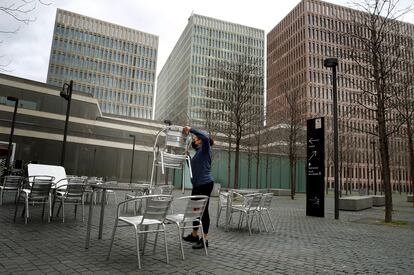As cases drop, some Spanish regions relax Covid-19 restrictions
Madrid, Navarre and the Canary Islands ease some measures, while Andalusia, Catalonia and Valencia are considering whether to do so

Some Spanish regions are starting to ease coronavirus restrictions, while others are considering doing so, due to falling infection rates that are still far above the government’s extreme risk threshold.
The national 14-day incidence rate has now dropped to 321 cases per 100,000 people from highs of 900 in late January, although this is still above the extreme risk level of 250 established by the Spanish government. In the Madrid region it is 427, while in the Canary Islands it is 118.
Madrid
Despite having one of the highest incidence rates in the country, the Madrid region will on Monday lift mobility restrictions in seven municipalities and 31 basic healthcare zones – administrative areas that do not coincide with districts or neighborhoods. For the full list of restrictions in the city and wider region go here.
This announcement comes after authorities on Thursday pushed back the curfew starting time to 11pm from 10pm, and allowed bars and restaurants to remain open until that time as well.
The deputy chief of the Madrid health department, Antonio Zapatero, on Friday confirmed that the 14-day incidence rate is 427 per 100,000 and said that the B.1.1.7 variant of the virus first reported in the UK now accounts for around 30% of infections in the region.
Despite having one of the country’s highest incidence rates, Madrid has the loosest restrictions in place, a policy that has drawn criticism from health experts.
Catalonia

The Catalan government will keep mobility restrictions in place one more week after the drop in infections slowed down over the last four days.
Restaurant opening hours remain limited to breakfast and lunch service, and administrative regions known as comarcas are still under confinement.
“We need seven more days to see the evolution of the curve and the impact of the new variants,” said the Catalan health chief Alba Vergés on Friday. “We want to see if there is a change in the trend. We have slowly been going down, but now we are kind of stuck.”
Canary Islands
The regional government has announced special measures for Carnival and reduced the alert level in Tenerife to 1. Gran Canaria is still at level 3 and Lanzarote at level 4. A 10pm-6am curfew will remain in place across the archipelago until February 22.
The executive is also reducing the number of people who may gather during the coming days to prevent massive social events during Carnival. Islands on level 1 (Tenerife, La Palma and La Gomera) and 2 (Fuerteventura and El Hierro) are allowing groups of six people from different households, while those in level 3 are allowing groups of four, and in Lanzarote only two people from different households may meet.
Bars and restaurants will close at 10pm on islands in levels 1 through 3, and at 6pm in Lanzarote.
Andalusia
The premier of Andalusia, Juanma Moreno, on Friday said that the regional government might consider “a small loosening” of restrictions on mobility and on economic sectors by the end of February, the daily Diario Sur reported.
The region’s borders remain sealed except for justified trips, and journeys across provincial lines are similarly restricted to essential business.
Valencia region
The deputy premier, Mónica Oltra, said that officials in charge of coronavirus policy will likely meet next Thursday to decide whether to ease existing restrictions in the region, which was posting an incidence rate of over 1,200 cases per 100,000 people in late January but is now down to 358.
The region’s borders will remain sealed until at least March 1, while bars and restaurants continue to be closed and retail stores have to close by 6pm.
Navarre
The regional government has decided to let bars and restaurants reopen at 30% capacity starting on February 26. A maximum of six people from two different households may gather in private spaces.
Vaccines
A new survey by the Center for Sociology Studies (CIS) shows that 82.9% of respondents are willing to receive the coronavirus vaccine, a 10.4 point rise from a month ago. As for the percentage of the population that rejects the immunization, it has dropped from 16.5% to 6.5%.
With reporting by Jessica Mouzo, Bernat Coll and Isabel Valdés.
English version by Susana Urra.
Tu suscripción se está usando en otro dispositivo
¿Quieres añadir otro usuario a tu suscripción?
Si continúas leyendo en este dispositivo, no se podrá leer en el otro.
FlechaTu suscripción se está usando en otro dispositivo y solo puedes acceder a EL PAÍS desde un dispositivo a la vez.
Si quieres compartir tu cuenta, cambia tu suscripción a la modalidad Premium, así podrás añadir otro usuario. Cada uno accederá con su propia cuenta de email, lo que os permitirá personalizar vuestra experiencia en EL PAÍS.
¿Tienes una suscripción de empresa? Accede aquí para contratar más cuentas.
En el caso de no saber quién está usando tu cuenta, te recomendamos cambiar tu contraseña aquí.
Si decides continuar compartiendo tu cuenta, este mensaje se mostrará en tu dispositivo y en el de la otra persona que está usando tu cuenta de forma indefinida, afectando a tu experiencia de lectura. Puedes consultar aquí los términos y condiciones de la suscripción digital.









































